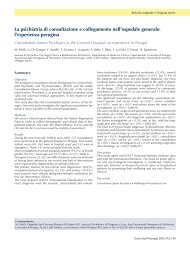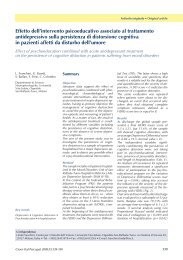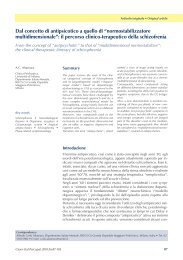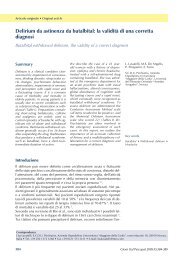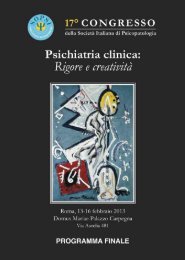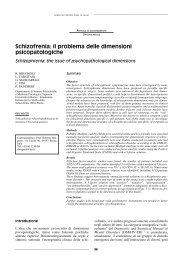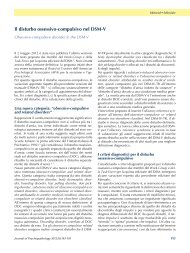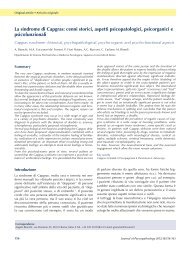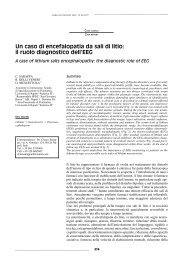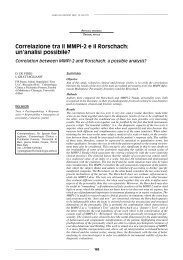XI Congresso della Società Italiana di Psicopatologia Psichiatria ...
XI Congresso della Società Italiana di Psicopatologia Psichiatria ...
XI Congresso della Società Italiana di Psicopatologia Psichiatria ...
Create successful ePaper yourself
Turn your PDF publications into a flip-book with our unique Google optimized e-Paper software.
cificità e complessità <strong>di</strong>versi da quelli con cui abitualmente<br />
interagisce: come le problematiche collegate alle sindromi<br />
maladattative ed ai traumi <strong>di</strong> restrizione, le necessità<br />
<strong>di</strong> affrontare terapie specialistiche integrate con i colleghi<br />
<strong>di</strong> altre branche, i rischi dell’autolesionismo e dell’esposizione<br />
all’altrui violenza senza <strong>di</strong>menticare le tossico<strong>di</strong>pendenze<br />
e le <strong>di</strong>fficoltà delle patologie a doppia <strong>di</strong>agnosi.<br />
La <strong>di</strong>mensione carceraria fa sì che si concentrino nello spa-<br />
Suicide as a treatable con<strong>di</strong>tion<br />
201<br />
SIMPOSI TEMATICI<br />
zio-tempo anche esigenze punitivo-penali e le esigenze rieducative.<br />
Le barriere fisiche <strong>di</strong>ventano facilmente barriere<br />
<strong>di</strong> competenza e <strong>di</strong> comprensione, cosicché da una parte c’è<br />
il rischio <strong>di</strong> frammentare e parcellizzare i progetti terapeutici,<br />
dall’altra sono presenti continue interferenze degli organi<br />
legali <strong>di</strong> controllo e <strong>di</strong> <strong>di</strong>sciplina a cui anche i me<strong>di</strong>ci devono<br />
sottostare, con un’ambiguità <strong>di</strong> fondo che fa slittare i<br />
rapporti dell’area sanitaria continuamente dalla custo<strong>di</strong>a alla<br />
cura, dalla repressione all’aiuto.<br />
25 FEBBRAIO 2005 - ORE 16.00-17.30<br />
SALA CAVALIERI 1<br />
S92 - Suicide: a me<strong>di</strong>cal perspective<br />
R.J. Baldessarini<br />
Professor of Psychiatry & Neuroscience, Harvard Me<strong>di</strong>cal<br />
School, Boston, Massachusetts<br />
Introduction: only recently has mortality associated with<br />
major psychiatric <strong>di</strong>sorders become an explicit topic of therapeutic<br />
research interest, stimulated recently by concerns<br />
about possibly increased suicidal risk during treatment with<br />
antidepressants.<br />
Methods: the presenter and his collaborators undertook a<br />
series of meta-analyses to summarize published and original<br />
data pertaining to rates of suicides and attempts and to ratings<br />
of suicidal thinking during various treatments.<br />
Results: clozapine is the only treatment to have regulatory<br />
approval for reducing suicidal risk (in schizophrenia patients).<br />
Evidence is abundant and consistent that long-term<br />
treatment of bipolar <strong>di</strong>sorder patients with lithium is associated<br />
with reductions in rates of suicides (S) and attempts<br />
(A) by about 80%, with decreases in the S/A ratio (a proposed<br />
“lethality index”) as well as in ratings of suicidal<br />
thinking. Lithium may be more effectively antisuicidal<br />
than other mood-stabilizers, and may have such benefits in<br />
nonbipolar depression. Evidence concerning antidepressants<br />
and suicidal risk, though abundant, is complex and<br />
largely inconclusive, with both minor increases and decreases<br />
reported; however, trial duration is relatively short<br />
and may be unbalanced between treatment arms. Reported<br />
short-term increases in suicidal thoughts and attempts<br />
among juveniles treated with SRI antidepressants vs.<br />
placebo raise special concerns, given inconsistent evidence<br />
of clinical efficacy of antidepressants in juvenile depression<br />
and risks of unrecognized juvenile bipolar <strong>di</strong>sorder.<br />
There is growing evidence that suicidal thinking decreases<br />
more with antidepressants than placebo, evidently<br />
paralleling overall clinical improvement but suggesting<br />
that the pharmacology of suicidal thinking and behviors<br />
may <strong>di</strong>ffer.<br />
Conclusions: major psychiatric <strong>di</strong>sorders are associated<br />
with increased mortality, particularly due to suicide. Evidence<br />
of beneficial effects of psychotropic treatments on<br />
suicidal risk is emerging, and is particularly strong for lithi-<br />
MODERATORI<br />
L. Tondo, G. Isacsson<br />
um. Debate over possibly increased suicidal risk in some antidepressant-treated<br />
patients encourages reconsideration of<br />
clinical practices regar<strong>di</strong>ng the care of potentially suicidal<br />
patients. Ethical and feasible therapeutic stu<strong>di</strong>es are urgently<br />
required to clarify potential benefits/risks regar<strong>di</strong>ng causes<br />
of excess mortality (inclu<strong>di</strong>ng accidents, complications<br />
of substance abuse and comorbid me<strong>di</strong>cal <strong>di</strong>sorders, as well<br />
as suicide) among the growing treatment options in contemporary<br />
psychiatry.<br />
Antidepressant drugs and suicide,<br />
consequences for prevention<br />
G. Isacsson<br />
Division of Psychiatry, Karolinska Institute, Stockholm<br />
SSRIs have repeatedly been accused of increasing the risk<br />
of suicide in depressed in<strong>di</strong>viduals. Based on interpretations<br />
of adverse events in clinical trials of paroxetine for<br />
depressed children, even authorities have warned for SS-<br />
RIs. On the other hand, research has demonstrated decreased<br />
suicide rates correlated to the increased use of SS-<br />
RIs, also in children 1 2 . Depression is the foremost risk<br />
factor for suicide, and the advent of SSRIs has allowed for<br />
a better treatment of depression. SSRIs constitute about<br />
80% of the use of antidepressants in all age groups in<br />
Sweden. It must therefore urgently be clarified if SSRIs<br />
possess some hidden suicide inducing property. We<br />
analysed all 14,857 suicides in Sweden 1992-2000 that<br />
were subjected to forensic toxicological screening 3 . We<br />
compared the detections of <strong>di</strong>fferent antidepressants<br />
among the suicides with those in a control group of<br />
26,422 deaths by accident or natural causes. When compared<br />
to the average of all antidepressants, the Odds Ratios<br />
in<strong>di</strong>cated highly significant underrisks for the SSRIs,<br />
average risks for tricyclics, and overrisks for venlafaxine<br />
and mirtazapine. These results does not support a suicide<br />
inducing effect of SSRIs. The implications of the fin<strong>di</strong>ngs<br />
are that suicide preventive efforts in all age groups should<br />
focus on the treatment of the underlying illness, depression,<br />
and that SSRIs constitute a safe and effective tool<br />
for this.



